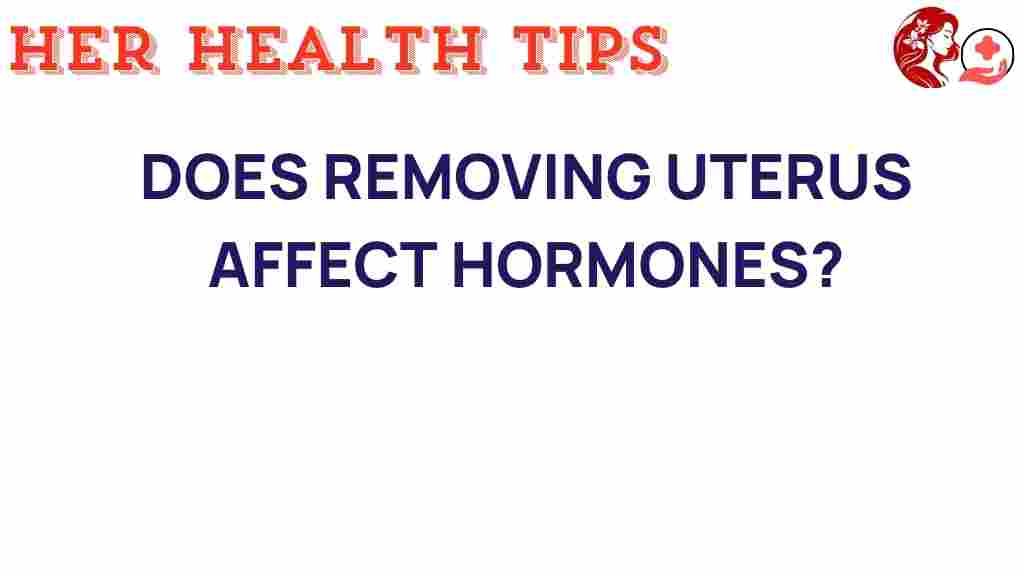Unveiling the Truth: How Uterus Removal Affects Hormone Levels
Uterus removal, clinically known as a hysterectomy, is a surgical procedure that involves the removal of the uterus. This operation is often performed for various medical reasons, including fibroids, endometriosis, and cancers. While the procedure can provide relief from certain health issues, it also has significant implications for hormone levels and overall women’s health. In this article, we will explore how uterus removal impacts hormonal balance, the health effects that may arise post-surgery, and what women can expect during recovery.
Understanding Uterus Removal and Its Purpose
Uterus removal is a common surgical procedure that can be performed through several methods, including abdominal hysterectomy, vaginal hysterectomy, and laparoscopic hysterectomy. The choice of method often depends on the underlying condition and the patient’s overall health.
- Abdominal Hysterectomy: Involves making an incision in the abdomen to remove the uterus.
- Vaginal Hysterectomy: The uterus is removed through the vagina, often resulting in a shorter recovery time.
- Laparoscopic Hysterectomy: A minimally invasive technique using small incisions and a camera for guidance.
Each of these methods has specific indications, and the decision to undergo uterus removal should be made after thorough consultation with healthcare professionals.
The Impact of Uterus Removal on Hormone Levels
One of the most significant concerns associated with uterus removal is its effect on hormone levels. The uterus itself does not produce hormones, but it is closely tied to the ovaries, which do. When the uterus is removed, particularly if the ovaries are also taken out (oophorectomy), there can be dramatic changes in hormone levels.
Hormonal Changes Following Hysterectomy
After uterus removal, women may experience various hormonal changes, which can lead to several health effects:
- Estrogen Levels: If the ovaries are preserved, estrogen production continues, but the hormonal balance may still be disrupted.
- Progesterone Levels: If the ovaries are removed, progesterone levels will drop significantly, affecting menstrual cycles and overall hormonal balance.
- Testosterone Levels: There may be fluctuations in testosterone levels, which can impact energy levels, mood, and libido.
Health Effects of Uterus Removal
The effects on hormone levels can manifest in various ways, leading to both short-term and long-term health issues. Understanding these effects is crucial for women considering or undergoing uterus removal.
Short-term Effects
Immediately after surgery, women may face a range of symptoms related to hormonal imbalances:
- Hot Flashes: Sudden feelings of warmth, often leading to sweating and discomfort.
- Night Sweats: Excessive sweating during sleep, disrupting rest and recovery.
- Mood Swings: Changes in hormone levels can lead to irritability and emotional instability.
Long-term Effects
Long-term consequences may include:
- Bone Density Loss: Lower estrogen levels can lead to decreased bone density, increasing the risk of osteoporosis.
- Cardiovascular Health Issues: Hormonal changes can affect heart health, raising the risk of cardiovascular diseases.
- Sexual Dysfunction: Decreased libido and vaginal dryness are common concerns post-surgery.
Post-Surgery Symptoms and Management
Managing post-surgery symptoms effectively is crucial for recovery and maintaining hormonal balance. Here are some steps women can take:
1. Hormone Replacement Therapy (HRT)
For many women, hormone replacement therapy can help alleviate symptoms associated with hormonal imbalances after uterus removal. HRT can restore estrogen and progesterone levels, helping to mitigate symptoms such as hot flashes and mood swings.
2. Lifestyle Changes
Implementing healthy lifestyle changes can significantly impact recovery and overall health:
- Balanced Diet: A diet rich in fruits, vegetables, whole grains, and lean proteins supports hormonal balance.
- Regular Exercise: Physical activity can help manage weight, improve mood, and maintain bone health.
- Stress Management: Techniques such as yoga, meditation, and deep breathing can help reduce stress and promote hormonal balance.
3. Regular Medical Check-ups
It’s important for women who have undergone uterus removal to have regular follow-ups with their healthcare provider. Monitoring hormone levels and overall health can help manage any long-term effects effectively.
Troubleshooting Common Concerns
Women may experience several concerns after uterus removal. Here are some common issues and how to address them:
1. Persistent Hot Flashes
If hot flashes continue beyond the initial recovery phase, consult your doctor about HRT or alternative therapies that may help.
2. Difficulty Sleeping
Night sweats can disrupt sleep. Consider lifestyle adjustments such as maintaining a cool sleeping environment and avoiding caffeine and alcohol before bed.
3. Emotional Changes
If mood swings or depression become problematic, discussing these symptoms with a healthcare provider is essential. Therapy or counseling may also be beneficial.
Conclusion
Uterus removal is a significant surgical procedure that can have profound effects on hormone levels and women’s health. Understanding the implications of this surgery is crucial for women considering the procedure or those who have already undergone it. By being proactive about hormone management, lifestyle changes, and regular medical care, women can navigate the challenges associated with uterus removal and maintain a better quality of life.
For more information on women’s health and managing hormonal issues, please visit this resource. If you are considering uterus removal, consult with a healthcare professional to discuss your options and the potential impacts on your health.
This article is in the category Reproductive and created by HerHealthTips Team
